
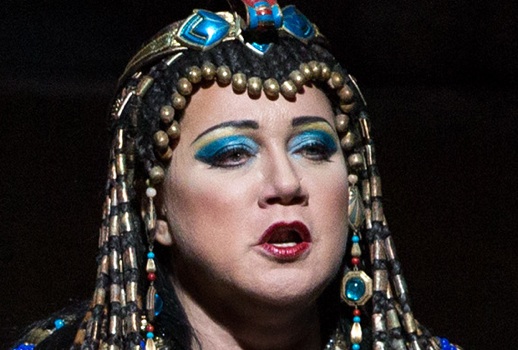
Let’s give credit where credit is due: Monastyrska has a mightily impressive instrument. You want volume? She has volume and then some—in the Triumphal Scene her voice soared over the orchestra, over the chorus, over everything. It was its own wall of sound. It blazed. You want range? She has range—her lower register occasionally lacks resonance, but her middle and upper register are ringing and free.
There’s no shrillness, no white tone, no strain. She just opens her mouth, and the notes come out. You want a voice? Monastyrska has a voice. The timbre has both cut and a certain plushness that sounds inherently right in Verdi. She has an evenly controlled vibrato, with none of that typical Slavic heaviness. She can modulate her dynamics from a ear-splitting fortissimo to a nicely modulated mezza voce. I bet if you were to listen to her sing a scale, you’d be mightily impressed.
However, it was quickly apparent that despite all these natural endowments, Monastyrska hasn’t a clue about the role. Her Aida is a complete blank. She gave no indication that she had read the libretto, and understood the story of the Egyptian princess/slave. She has no idea how to emphasis the “money” moments—everything blares out in the same monotonous, graceless way.
She avoids any hint of vowels or consonants—“Numi, pieta” sounded like “Oooh-ahhh booo-ahhhhh.” When the score calls for lyricism, she went for an ugly, crude loudness. The four-wheeler-drives-through-the-mud ascent to the high C in “O patria mia” was the most unfortunate example, but she also barked through “Lá tra foreste vergini” and sang “O terra addio” as a series of bizarre clipped staccato phrases.
She avoided any interaction with any other singer onstage. And acting? It consisted of her moving her right arm. Sometimes it went up, sometimes it went down. Sometimes she stretched her fingers, sometimes she balled them. And that was it.
Her face was a passive stare, and it doesn’t help that when she sings the formation of her mouth forms an Elvis Presley sneer. The only exception was a bizarre one: in the tense scene with her father, Monastyrska all of a sudden shimmied and made bedroom eyes. I’ve never seen a singer with such an impressive array of goods use them to less effect.
The yin to Monastyrska’s yang was Olga Borodina (Amneris). Age and time have diminished Borodina’s instrument. She no longer has the amplitude or upper register to really sing the Judgment Scene. The sultry, sexy timbre occasionally sounds quavery and worn. But Borodina is still every inch the Egyptian princess. The hauteur, the pride, the desperation, it’s all there. She walked onstage, cast her famous side-eye and bitch-face at Aida, and the opera officially began.
Borodina’s diction was a joy to hear next to Monastyrska’s mush-mouth—you could transcribe nearly every word Borodina sang. And in the quieter, more lyrical moments, Borodina’s voice was still beautiful. Her final prayer floated over the whole entire house like a balm.
There was something poignant about Borodina’s Amneris—she was done up in a ridiculous costume and head-dress (a leftover from the 1988 Ten Commandments On the Cheap production), but she believed in the role, she believed in the opera, and when she was onstage, you believed too.
Otherwise the 1,133th performance of Aida at the Metropolitan Opera was a depressing affair. The production is looking its age—at one point, some supers leaned against the wall and you could see it trembling. Costumes should be redone—someone needs to point out that the average thick-waisted opera singer does not look good in a white muumuu with gigantic 1980’s shoulder-pads. Also, all that white reflects poorly in the harsh lighting, and the faces of the singers are obscured.

At one point, he opened his mouth, and no sound came out. He looked mortified. He pulled it together somewhat for the final two acts, but you can’t really give a good performance without a semblance of a voice. It was depressing.
Zeljiko Lucic (Amonasaro) has just finished a run of Macbeth but I think the voice is what it is now—he’s still musical, still always gives a professional, committed performance, but the actual sound is no longer pleasant. Amonasaro is a shorter role and the tendency to bark is more acceptable, I guess.
The supporting roles were excellent. Always heartening, to see that yes there are good singers in the pipeline. Dmitry Belossekskiy (Ramfis) and Solomon Howard (Pharaoh) were both excellent basses—strong, resonant, and both had excellent carriage. They looked proud to be on that stage, and proud to be singing. Lori Guilbeau was also a nicely ethereal High Priestess.
The Met Chorus did their usual excellent job, even though in this revival they’ve been directed to simply stand in rows as if they were in church bleachers. The only thing that livened up this revival were the two horses who marched across the stage in the Triumphal Scene. They happened to be onstage when the brass and horns were out of tune, Monastyrska was belting into the rafters, and Giordani was haplessly trying to “sing.” They started violently shaking their heads, and you could see them thinking, “I’m mad as hell and won’t take this anymore!” The audience laughed with them. And considering how many people I saw leaving during each intermission or pause, I think their sympathies were with the horses.
Photos: Marty Sohl/Metropolitan Opera.














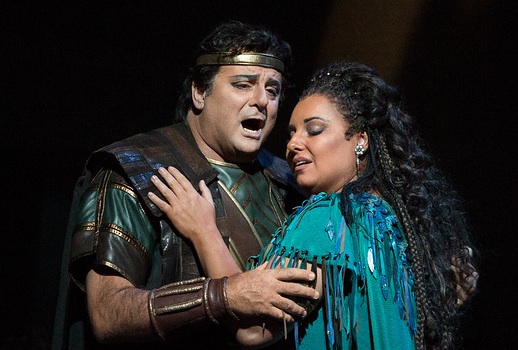
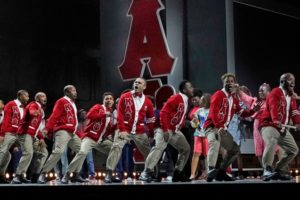
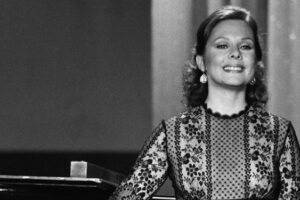
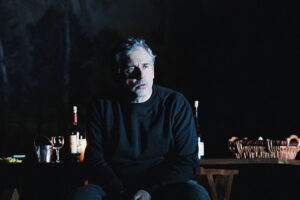
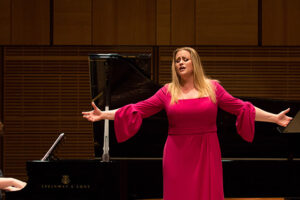





Comments